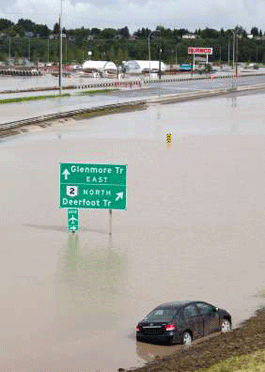 Severe weather in Canada is top of mind of many Canadians as southern Alberta-Calgary, High River, Canmore, Drumheller, and Medicine Hat-is saturated with waters from the Bow River, Elbow River, Highwood River and the South Saskatchewan River. The floods are breaking records no one wants to see broken, and have been confirmed by the Government of Alberta as the worst in Alberta's history.
Severe weather in Canada is top of mind of many Canadians as southern Alberta-Calgary, High River, Canmore, Drumheller, and Medicine Hat-is saturated with waters from the Bow River, Elbow River, Highwood River and the South Saskatchewan River. The floods are breaking records no one wants to see broken, and have been confirmed by the Government of Alberta as the worst in Alberta's history.
Flooding Disasters in Canada
Unfortunately, extreme floods and severe weather in Canada are increasingly more common if insurance claim payouts are any indication. According to the Insurance Bureau of Canada (IBC), "Losses from natural catastrophes in Canada are rising. Claim payouts from severe weather have doubled every five to ten years since the 1980s."
Flood disasters in recent Canadian history
No community is immune and it's easy to find reports on extreme weather flooding coast-to-coast.
- Toronto, Ontario: On October 15, 1954, Hurricane Hazel dumped an estimated 300 million tons of rain on Toronto and left 4000 families homeless.
- Chicoutimi, Quebec: In mid-July, 1996, torrential rains caused flooding and mud slides in Quebec's Saguenay River valley. The Saguenay Flood has the dubious distinction of being labeled Canada's first billion dollar natural disaster.
- Peterborough, Ontario: On July 15, 2004, the City of Peterborough recorded a record rainfall of 175 mm of which 78.8 mm fell during a one hour period.
- Saint John River, New Brunswick: In May, 2008, New Brunswick saw its worst spring flooding in 35 years, causing $50 million or more in damages to homes, farms and small businesses.
Water damage and your insurance
Water damage-and whether or not it is covered under your property insurance policy-is a complicated issue; it depends on what caused the flood.
Overland flooding
Overland flooding usually occurs when water breaches its normal confines and overflows onto nearby land. This type of flooding usually is a result of a heavy rainfall, like that seen in Alberta, or a sudden melting of ice and snow. Damage resulting from an overland flood is not covered by any home insurance policy in Canada.
- Why is overland flooding not covered?
The IBC explains why this is the case: "Overland flooding and seepage can't be covered by home insurance because it is only a risk for the small percentage of the population who live in a flood plain. Since the purpose of insurance is to spread risk among many policyholders, flood insurance for those at risk would be unaffordable."
Although overland flooding is not covered, it may cause a sewer back-up which is covered (so long as you've got the sewer back-up endorsement).
Sewer back-up flooding
For flooding that occurs as a result of a sewer back-up, you'll be covered if your policy includes the sewer back-up endorsement. Many homeowners' policies provide this optional coverage, although you may have to request it to get it. It's a particularly good idea if you live in a low-lying area or in an area with combined storm and sanitary sewers (like Toronto.)
Minimizing Flood Damage
No matter what the source of the flood, there are a few tips offered by the IBC to help you minimize losses:
- Move valuables from the basement to upper floors.
- Do not stack wet items on dry items just to get them off the floor.
- Dry the flooded area within a few days to prevent mould growth.
- If the water is from a freshwater source, quickly retrieve from the flooded area any valuables.
- If the flood source originates from the septic system, avoid contact with the water and do not cross-contaminate unaffected areas by walking in and out of the contaminated areas.
Home insurance, water damage and floods: Learn more




